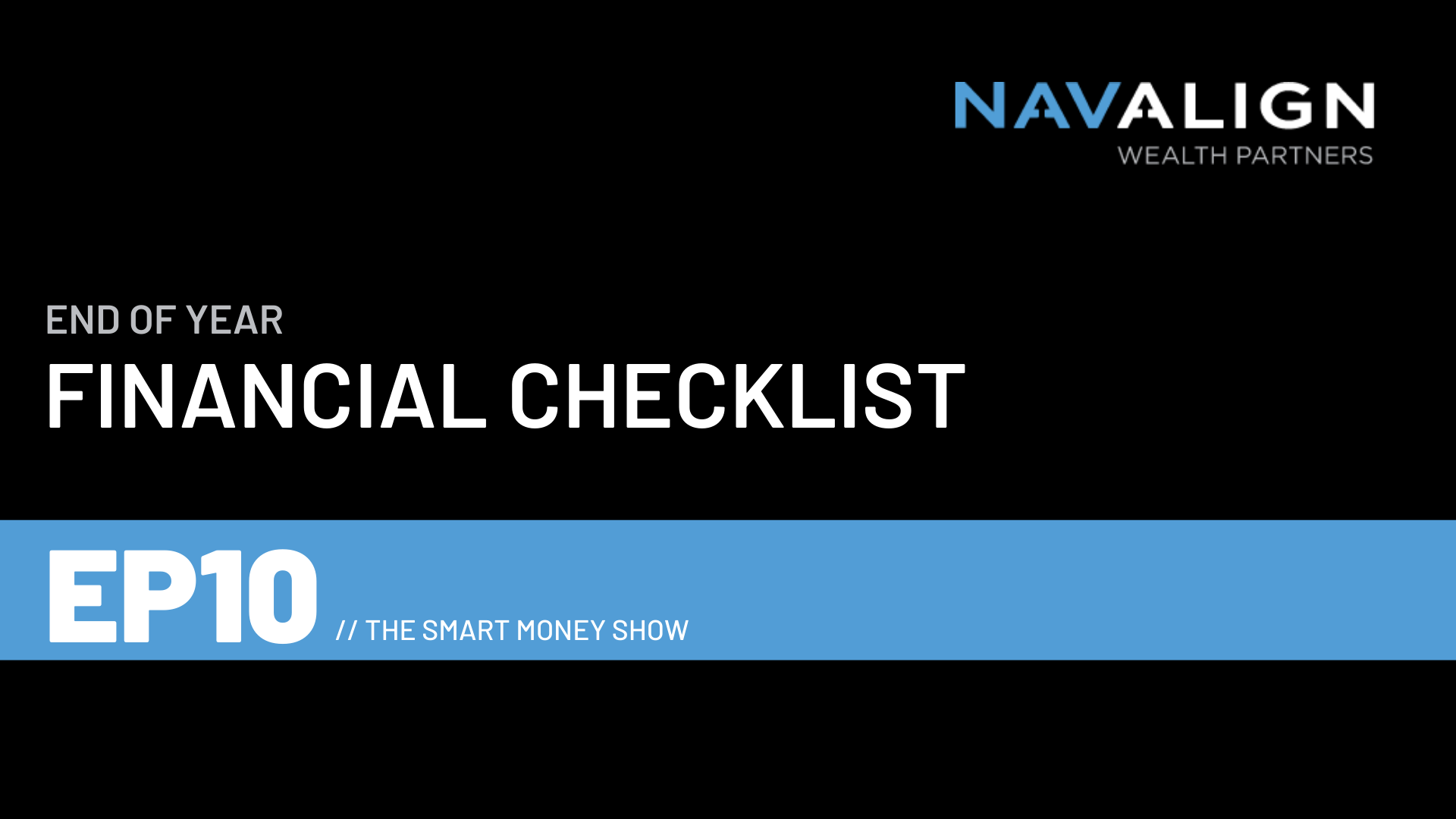Monday, November 23rd, 2020

Stephen: Welcome back and thanks for tuning in to another episode of the smart money show. Today we’re going to talk about the things that should be on your year-end Financial checklist. Matt let me take this over to you, we just wrapped up the election. For the most part it’s done, right?
Matt: Well, ya for the most part.
Stephen: We’ll have to do a recap of that on our next episode, for the most part elections are mostly behind us now, COVID-19 is definitely having a resurgence across the U.S. especially here in Los Angeles.
All that being said, what are some of the items that are top of mind for you on your year-end Financial Checklist?
Matt: Well, I think all of our clients need to consider things that you know every year kind of pop up this time of year. There’s usually a couple biggie’s, one is retirement plan contributions. Certainly, anybody that’s deferring some of their income into their 401k will want to revisit where they’re at for the year.
You know if you set it so that you’re going to max it out, good for you, that’s the best thing you can do, but you also want to, if you haven’t, make sure that you have your deferrals set to take any year-end bonuses that you might be getting, hopefully.
Then of course, although we have time, you have time to make contributions to your IRA or Roth IRAs, you’ll have until April 15th. It’s a good idea to kind of get familiar with where you stand for the year, your cash flow, if you can make those contributions, and at least with your IRAs, prepare to do that in the Spring.
Stephen: Yeah, that’s a good point, because some retirement plans and retirement accounts you have until April 15th, others you don’t. Either way, the end of the year is a good time to check in on that.
You know another contribution I always think about at the end of the year, are charitable contributions. I looked this up, probably not a surprise, but more 1/3 of all charitable giving happens in December, and 12% of all charitable contributions, happens in the last three days of the year.
No reason you can’t do that sooner. If you have organizations, especially in year like this year, so if you can give a little more, and help out local organizations or national organizations.
If you have questions about that, there’s ways that you can contribute donations directly from your Investments, for retirement accounts, certainly something that you should be thinking of at the end of the year.
Matt: Yeah, and I think it’s a good time to remember funding 529s that you historically have been funding, for those loved ones of yours. There are less tax consequences, at least here, there isn’t a tax benefit here in the state of California, but you know it might as well be on a checklist at the year-end, to take care of it as a housekeeping item.
Stephen: Yep, so 529 contributions, retirement contributions, charitable contributions,
You know, another one, that I think is always good to check in at the end of the year. We’ve been talking with a lot of people about it this year, with their Estate Planning and everything else.
Your beneficiary designation. So you know, maybe something’s changed, your children are a little bit older, or maybe not older and you had some change of heart. The point is, you should really take inventory of who are your beneficiaries on your different accounts, and for retirement accounts at work.
Who is the Executor of your Estate in your Will? Who is the successor trustee in your trust? End of the year is a good time to check in on some of those estate planning items as well.
Matt: Yeah, we’re typically not thinking about our mortality during the course of the year. And who wants to consider that, but it’s a good end of the year checklist thing to do, is to make sure that we’re taking care of that part of our lives.
Another one, you know that I think it’s good to think about this time of year, although we’re certainly front and center of this conversation, is getting a handle on your on your accrued capital gains over the course of the year and whether or not it makes sense to deploy strategy, do some tax-loss harvesting at the end of the year.
Typically, you know, we are there for all of our clients and proactively attempting to make these trades for them, to mitigate and minimize taxes. But it’s also good for each client to know where they stand for the year.
So if that’s something that you want to be prepared for, you know we’ve had a run up at the end of the year. So some of our ability to be able to take some tax losses are going to only be there if they happen to be in the market, and the market gives those up.
You know, the good-news-bad-news side of that equation is if the market starts going down for some reason here in that latter half of the year. We will have those opportunities for people with capital gains built up for 2020. We will have some of those opportunities to reduce that overall tax hit, but you know let’s face it you have capital gains it means you’re making money and you know that is part of a game here.
Stephen: That’s true, that’s part of the price of admission. It’s better than the alternative, you make some gains, you pay some taxes. Other than that, you’ve got losses, and that’s the only way to not pay taxes. So I rather have gains.
Matt: We’re trying to take tax losses on those taxable accounts at the end of the year as a way to minimize your taxes, legally, and you know it’s something you can do to reduce those taxes.
Stephen: That’s true, and maybe you have a situation where you actually want to take capital gains this year instead of next year. It just depends on your income situation and everything else.
So these are all really good examples of things that should be on your year-end financial checklist. We should probably put together a checklist, you know we will do that. We will put together a resource, a checklist, if you guys want to download that, we will make it easy to find and send it out to everybody. We will put it on our website and put it on our social media.
I think the last one I’d like to leave us with here, is at the end of the year, it’s really important to check in with your goals and your progress. Look back, what were your accomplishments? What were your challenges? Take stock of what went well and what didn’t go so well and really you need to set new goals.
If there’s one thing that I’ve seen him about folks that are very successful, whether in business or otherwise, it’s that they’re really good about setting goals, tracking progress towards those goals, and when they’re done with that goal, they set another one. They don’t just settle for complacency.
Think about the championship this year for the Los Angeles Lakers and the Los Angeles Dodgers. Fine, they might have taken off for a couple days, but they’re already back on the court, they’re back on the field. They’re already practicing. That’s because they’re already focused on their next goa, and your financial goals shouldn’t be any different than that.
Matt: Another way to phrase that a goal, it’s connected with that, is your priorities. I mean certainly 2020 has given us all a lot of things to think about. The pandemic has certainly been a great influence on our life. Certainly, the presidential election has also given us alot of things to think about, whichever side of the political fence you’re on.
Both your goals and your priorities could shift based on those two things, and so, while it’s normal and its regular for us to revisit those goals and prioritize them every year, just to make sure that we’re managing your money and we’re on track, aligned with those goals.
Certainly 2020 has really laid a bunch on all of us, and it’s probably necessary for all of us to take stock at the end of the year related to goals and priorities.
Stephen: Yep, that’s perfect. Look if you learned something new, if you liked this video show us some love give us a like, share it with your friends and your loved ones, because you know what, they probably have some of these items on their mind and are planning their financial year end.
Until next time I’m your host Stephen Rischall, along with Matt Stadelman, and this is the Smart money show.

